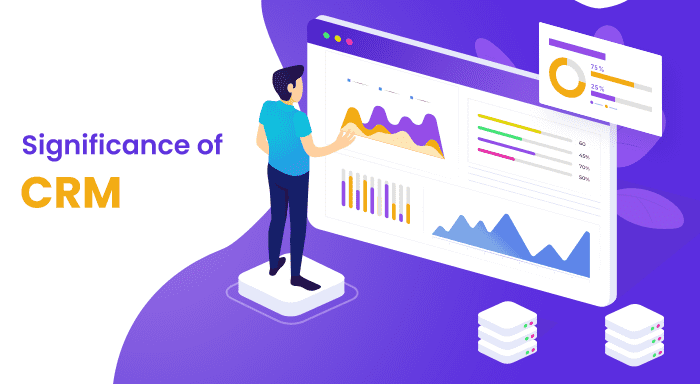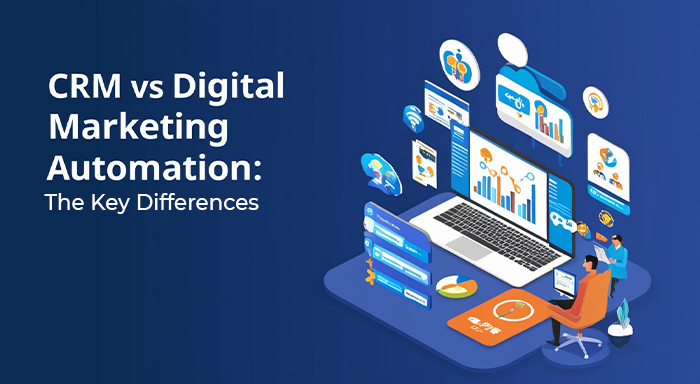Managing your insurance operations and sales digitally is an inordinately tricky task. You can recruit the best salesperson for the job, but that is only one piece of the puzzle. Sales teams have limitations when they are working on their own without any digital platforms. Relying on manual processes increases their workload and leads to a lot of unproductive hours. A recent survey indicates that more than half of insurance CEOs agree that adopting technology improves overall competitiveness. Thus, the role of CRM in insurance cannot be underestimated.
Understanding CRM Software for Insurance Agents
Insurance CRM is a powerful platform that helps companies centralize all customer-related data, streamline operations, and enhance customer interactions. Primarily, it works as a bridge between the insurer and the insured, enabling efficient communication and customized delivery. Essentially, a CRM can consolidate all contact details of the customers, their purchase history, and policy details at a centralized platform. Moreover, it can automate various processes like claims processing, lead nurturing, and policy renewals.
What Is the Role of CRM in the Insurance Sector?
For businesses in any sector, customer relationship management ensures the best opportunities for understanding leads and customers. This helps businesses to boost their relationships with prospects and customers. CRM software benefits insurance companies a lot and enables the sales team to meet their sales objectives:
Enhance Customer Experience
Since the agents have a clearer understanding of prospects and customers, it becomes easier for them to offer tailored services to individual clients. For example, insurance companies can identify the right communication channel for a particular customer by gaining insights from the inquiry forms. All the data from the inquiry forms are automatically stored in your insurance CRM and are readily present on the dashboard.
Some customers prefer regular updates via email while others prefer telephonic conversation. It is the job of the insurance companies to cater to these requirements as they are a pivotal aspect of core customer experience. Customers might tilt toward other companies if they feel their preferred mode of communication is not being respected.
A higher satisfied customer base plays a crucial role if you are targeting more prospects. A high retention rate naturally fuels word of mouth marketing and creates a sense of trust within your leads.
Comply with Regulations and Industry Rules
Data privacy regulations are some of the trickiest regulations that each business needs to adhere to. The introduction of CRM in insurance sector has played a crucial role in facilitating this compliance. The best CRM for insurance agents must be a GDPR complaint. Thus, apart from storing data related to prospects and customers, CRM can help insurance businesses ensure data security.
Identify the Best Sales Opportunities
As an insurance business, you might have to look after thousands of leads. However, not all leads will necessarily convert into customers. CRM for insurance companies helps you find the most ideal leads. You can then concentrate your efforts on these leads to maximize the conversion rate. In the best CRM platform, all you must do is set specific criteria like financial status, age, policy preferences, age, location, etc. In this way, you can select the most relevant leads from the shelf and prioritize them.
Enhances Productivity
One of the most notable advantages of insurance CRM is the fact that it automates numerous tasks. Tasks like policy renewals, lead management, and claims processing can easily be automated with a fully integrated CRM tool. Automation allows insurance companies to have a lot freer time. Teams can use this time to manage complex claims or strengthen relationships with clients. Thus, the CRM for insurance agents can vastly enhance their productivity and effective automation of processes.
Better Sales Processes
All tricky tasks starting from lead generation to policy issuance can be streamlined with the help of CRM solutions. Automating such tasks can help in minimizing the resources and time needed for handling sales processes. Since most automated tasks can get automated, agents can spend a lot more time strengthening client relationships and prioritizing revenue generation.
An effective CRM platform helps you:
- Get more detailed visibility through regular check-ins
- Enhance renewal rate and add new leads easily
- Intervention via low-engagement alerts
- Effective execution of sales through logging of mobile activity.
- Implement geo-tracking.
Thus, the incorporation of CRM in insurance sector has allowed companies to improve their renewals and leads. This enhances sales execution and ensures more effective communication and visibility within the sales processes.
More Effective Analytics
A CRM platform can allow insurance companies to analyze customer behavior, sales trends, and agent performance. Analyzing these factors can help companies get important insights related to agent performance, sales trends, and customer behavior. Equipped with data-driven insights, insurance providers can make more informed and confident decisions. For example, analytics can let companies know which sales agents need additional training and which products need to be promoted more. Insurance CRM not only helps organizations optimize their key operations but also boosts customer satisfaction.
What Is the Current Market Situation in the Insurance Industry?
The insurance industry has become greatly competitive in recent times and challenges are multifaceted. Major challenges include evolving compliance, the rise of disruptive outside businesses, and changing customer needs. Businesses are consistently adopting customer relationship management tools to drive their customer engagement and retention rate.
Essentially, CRM in insurance industry has redefined the way insurance companies communicate with customers. In 2020, the industry did see a 15% decline in profitability and a reduction in growth to 1.2%. The Asia Pacific region saw the most significant decline of 36% primarily due to a reduction in insurance profits. However, from 2021 onwards, the profit margins started to grow as businesses resumed.
In 2025, insurance companies are facing a new set of challenges like rapidly evolving customer expectations, shifting risk profiles, technological advancements, etc. The rise of AI, digital transformation, rising inflation, shortage of qualified manpower, and climate risk management have encouraged insurance companies to evolve and innovate.
Conclusion
A customer relationship management tool is an indispensable tool for insurance companies. It helps streamline sales processes, enhancing the productivity of the team, and centralizing all key data. It allows the sales team to not only have the latest customer details but also have a lot of free time. The sales team can then use the insights to personalize interactions, elevate conversion rate, and maximize productivity. The blog elucidates the role of CRM in insurance sector and how insurance agents benefit from it.
Author’s BIO

Hello, I am Ashish Dwivedi. I am a core CRM developer with 15+ years of experience in delivering efficient CRM solutions that drive business growth and efficiency. I specialize in creating extensions for SuiteCRM and SugarCRM. My most notable extensions include SuiteCRM Email to Lead, SugarCRM Mailchimp, and SuiteCRM BCC Archiver. I also have a CRM of my own called OutRightCRM.








